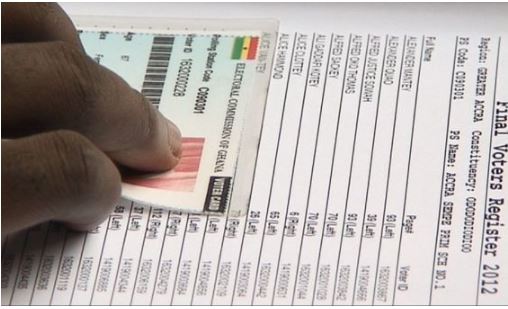The Electoral Commission (EC) has mounted yet another defence for the compilation of a new voters’ register ahead of the 2020 general elections.
This justification is coming in despite the concerns raised by the opposition National Democratic Congress (NDC) that there is no real need for a new register for the upcoming polls.
News from the EC to compile a new voters’ register has been a controversial subject in the country with political parties expressing divergent views.
The Commission insists the software being used to run the current biometric devices is “outdated and out of service”, and that most of the biometric verification devices are faulty with high repairing costs hence the need for a new and better Biometric Voter Management System (BVMS).
Addressing the media on Tuesday, Deputy Chairman in-charge of Operations, at the EC, Samuel Tettey, maintained that:
“There is no doubt that the voters register is bloated. The bloat is because we have not developed an effective way of cleaning the register. The bloated register increases the cost of our elections. The Commission always procures election materials based on the number of registered voters. This causes a lot of waste as the number of registered voters exceeds the actual voters.”
“…Again, the Commission will go ahead with the preparation of a new biometric voters’ register based on the reasons provided earlier,” he said.
General Secretary of the NDC, Johnson Aseidu Nketia has said it would be a waste of resources to buy biometric equipment for the election.

The opposition National Democratic Congress (NDC) has on countless occasions disagreed with the introduction of the new biometric system and a new register.
It is for this reason that its officers walked out of a meeting with the Electoral Commission on December 10, 2019.
According to the EC however, the new biometric system the commission intends to procure will have a facial recognition technology to be deployed in cases where the devices are unable to verify fingerprints of voters.
“The Commission intends to reduce the increasingly high identification failure rate by using a new software to improve fingerprint capturing and image quality. The current biometric voter device and the biometric voter registration kits are challenged by their inability to do biometric fingerprints,” he said.
“This was a labour intensive and expensive process that spanned through several months. The Commission had to hire additional hands to get the device ready for the district level election. The Commission spent close to GHc2 million to repair the machines for the district level election. The amount used for replacing a faulty device cost more….compared to getting new ones,” Mr. Tettey added.
EC’s new biometric register needless – Yaw Oppong
Legal Practitioner, Yaw Oppong had earlier described as needless the EC’s decision to procure a new biometric system.
Mr. Oppong believes the EC should channel its energy towards getting a credible system of verifying prospective voters rather than procuring a new biometric register.
“We should concentrate on getting one system of verification. Once we do that we will reduce this procurement. We need to ensure that we complete the registration process and avoid all these. I think it is so needless.”
Ghana started using biometric system in 2012
Ghana’s Electoral Commission first used biometric technology to register and verify voters in the 2012 general elections.
The EC again used the biometric system to organise the district level elections, three years after it was first used.
The EC also used the same system and voters’ register to organise the 2016 general elections.











